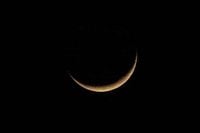Saudi Arabia’s Supreme Court has called on Muslims across the Kingdom to sight the crescent moon on the evening of Saturday, March 29, 2025, a crucial step in determining the start of Eid al-Fitr. This announcement, made on March 27, 2025, signifies the end of Ramadan, which began on March 1, 2025, and will either conclude on March 30 or extend to March 31, depending on the sighting of the moon.
The Supreme Court's official statement urged anyone who sights the crescent—whether with the naked eye or using binoculars—to report their observation to the nearest court and register their testimony. This community involvement is encouraged as part of a broader effort to engage the Muslim community in this significant religious observance.
In its advisory, the Court emphasized the importance of moon sighting, stating that participating in such efforts is considered an act of righteousness and piety. Muslims are encouraged to join regional committees formed for this purpose, ensuring that their observations contribute to the collective effort of the community. Individuals may also contact their nearest observation center to facilitate their reports.
If the crescent moon is not sighted on March 29, Ramadan will extend to 30 days, leading to Eid al-Fitr being celebrated on Monday, March 31. Conversely, if the Shawwal crescent is sighted, Eid al-Fitr will commence on Sunday, March 30, marking the end of the holy month of fasting.
Eid al-Fitr, celebrated on the first day of Shawwal, the 10th month of the Islamic lunar calendar, holds great significance for Muslims worldwide. It is a time of joy, feasting, and communal prayers, symbolizing the conclusion of a month dedicated to reflection, prayer, and fasting.
The announcement also aligns with similar calls from other countries in the region. For instance, the UAE's Fatwa Council has urged Muslims in the Emirates to observe the crescent moon on the same evening. Those who see the crescent are encouraged to report their sightings to the appropriate committees.
However, the UAE's Astronomy Centre has cautioned that sighting the crescent may not be feasible in many parts of the world due to various astronomical conditions. They have provided a map indicating the areas where the moon is most likely to be visible, highlighting the complexities involved in moon sighting.
In preparation for Eid al-Fitr, Saudi Arabia's Ministry of Human Resources and Social Development has announced a four-day holiday for the private and non-profit sectors, starting on March 30 and continuing until April 2. With the workweek resuming on April 3, this holiday will grant employees an extended break, combining with the existing Friday-Saturday weekend to provide a six-day holiday.
The anticipation surrounding Eid al-Fitr is palpable, as families prepare for celebrations that include special prayers, feasting, and giving to charity. The holiday is not only a time for personal reflection and gratitude but also serves to strengthen community bonds through shared festivities.
As the moon sighting approaches, the Supreme Court's call underscores the importance of community participation in Islamic traditions. It reflects a commitment to preserving cultural practices while fostering a sense of unity among Muslims in Saudi Arabia and beyond.
In the lead-up to this significant occasion, many individuals are looking forward to the celebrations, which include traditional meals, gifts, and gatherings with family and friends. The communal aspects of Eid al-Fitr are a vital part of the holiday, reinforcing relationships and shared values within the Muslim community.
As the date draws nearer, the excitement builds, with many hopeful for a clear sighting of the crescent moon. The outcome will not only dictate the timing of Eid al-Fitr but also set the tone for the celebrations that follow, marking a joyful conclusion to the month of Ramadan.
In summary, the Supreme Court's announcement serves as a reminder of the communal spirit of Eid al-Fitr and the importance of individual participation in the moon sighting process. As Muslims prepare for this cherished holiday, the anticipation of coming together with loved ones and the broader community remains at the forefront of their minds.







